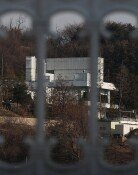Real estate policy should be rebuilt from people’s perspective
Real estate policy should be rebuilt from people’s perspective
Posted December. 08, 2021 07:57,
Updated December. 08, 2021 07:57
The government and the ruling Democratic Party are making efforts to drive a right-wing approach to real estate policies around three months into the presidential election. They appear to be conscious of recent polls that state ‘failed real estate policies’ as the number one reason for political leadership change. There are several regulatory inconsistencies, however, that have been accumulated over the last four and half years and overturned depending on political interests.
The government passed the amended act on Tuesday at the cabinet meeting, which raised the limit for tax-exemption of transfer income tax for household that own one property, from 0.9 billion to 1.2 billion won based on real transaction price. The act goes into effect today. The government has expedited the implementation of the act as the public criticized the inequity of the two-week period it normally takes to implement the law after being passed by the National Assembly in two days given that some would be forced to pay more taxes due to delayed execution.
The Democratic Party revoked its plan to add requirements for property sellers that own single property to live on the property it plans to sell to be eligible for special deduction for long-term property holding of transfer tax. The party is aware of how the change would impact middle-age voters owning a single but high-priced property. It also gave up plans to impose heavy transfer taxes on non-commercial properties to root out land speculation, particularly in relation to the recent LH scandal. Many in the ruling party had claimed that transfer tax for multiple property holders should be temporarily eased to give them opportunities to sell, though the government had opposed.
Real estate-related tax regulations are in shatters due to inconsistent government actions for temporary quick fixes. The threshold for ‘high-priced property’ has increased in 13 years to ‘market price of 1.2 billion won,’ while comprehensive real estate holding tax for single property owners are imposed on properties above 1.1 billion won based on official price. Property tax is deducted for properties exceeding 0.9 billion won in terms of official price, while mortgage support is prohibited for houses exceeding 1.5 billion won based on market price. Lacking inconsistency is evident across various tax items and regulations.
The burden of comprehensive real estate holding tax, which is imposed on around 1 million homeowners, is increasing as well. Unlike the government and ruling party claims that “98% of the people are exempt,” one out of every five homeowners are subject to the tax. Homeowners are raising rents to pay for their tax, which has increased by as much as tens of millions of won, impacting tenants with higher rent costs.
The current real estate policy, which has failed due to the government’s anti-market actions, cannot be restored with the ruling party’s stopgap measures that cater to public opinions. The ruling party should admit failures of the policy and review and rebuild tax policies from a public perspective.






